#jerome bonaparte
Text
Happy birthday Jerome Bonaparte! November 15, 1784
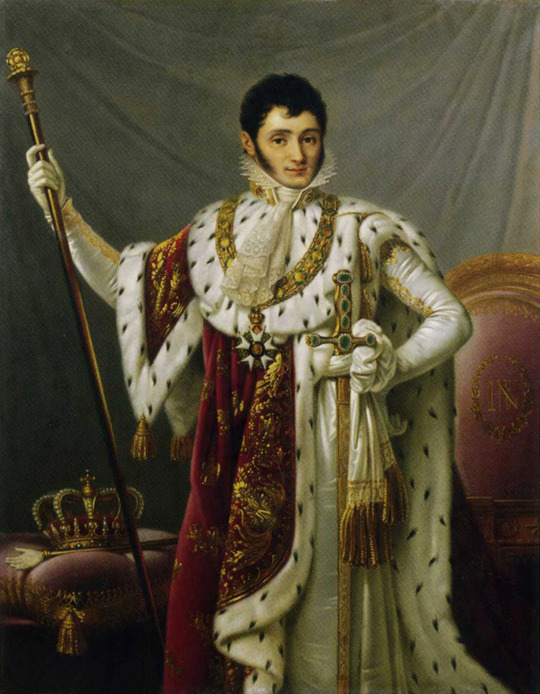
71 notes
·
View notes
Text
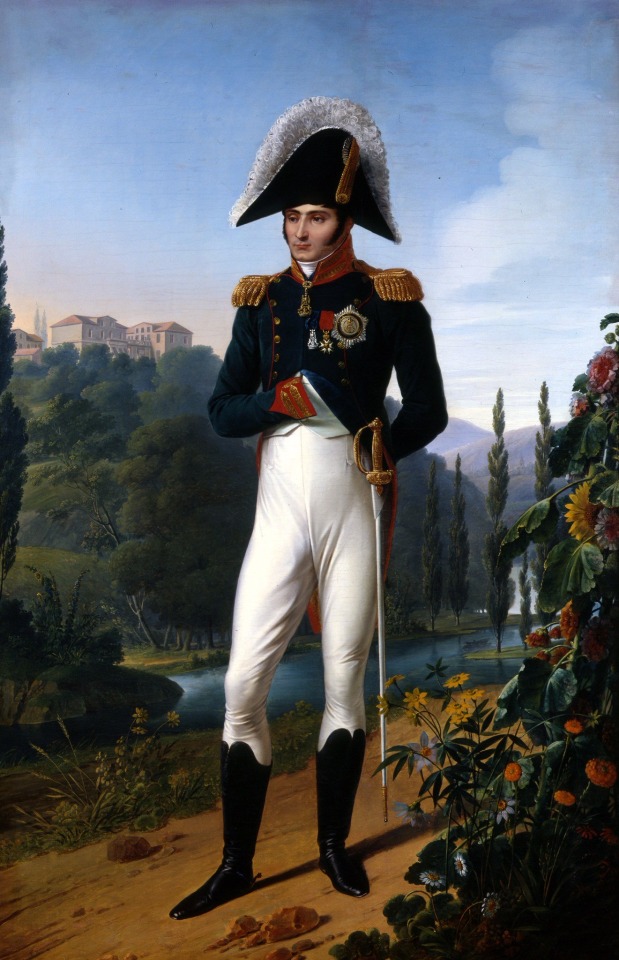
Jérôme in his daddy long leg era
Portrait of Jérôme Bonaparte by François-Joseph Kinson, c. 1807-1813, The Bowes Museum
#jerome bonaparte#Jerome#Napoleon’s brothers#Jérôme#Jérôme Bonaparte#François-Joseph Kinson#Kinson#napoleonic era#napoleonic#first french empire#french empire#art#19th century art#19th century#history#1800s art#bicorne#Barnard Castle#The Bowes Museum#Bowes Museum#Napoleon’s family#Napoleon’s siblings
27 notes
·
View notes
Text
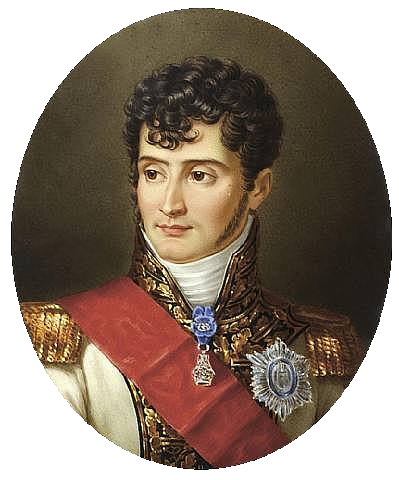
Jerome Bonaparte.
The youngest of the four Bonaparte brothers and also the only sibling living to see the Second Empire. (Not that he was very fond of Napoleon III.)
And this apparently despite a lead bullet lodged in his sternum from a duel with Davout's brother. A duel fought over a woman. When Jerome was 15 years old.
Mostly known for his extravagance and expensive taste. And - that's why I love him best: for being completely undeterred by big brother's obligatory sermons.
Also much more intelligent than people give him credit for: Like it or not, Naps, but Jerome did not go to Moscow...
#napoleon's family#jerome bonaparte#king of westphalia#napoleonic sexyman tournament#propaganda#propaganda i fear will be pretty useless
23 notes
·
View notes
Text

Jerome Bonaparte was basically the first Napoleonic personality I got introduced to. Back in elementary school our class was walking through Kassel (the capital of Jerome's Kingdom of Westphalia) and our teachers pointed out a poster advertising an exhibition. They told us how there once lived a king in Kassel, however he wasn't a native German and it was said the only thing he knew how to say in German was 'Morgen wieder lustig' ('tomorrow funny again'), which earned him the nickname 'König Lustik' ('King Funny'). I didn't get interested in (Napoleonic) history until much, much later, but that (most likely not true) anecdote stuck with me ever since.
#jerome bonaparte#napoleonic era#napoleonic wars#historical art#hometown hero ... i guess#look this city doesnt have a lot going for it#my art
62 notes
·
View notes
Text
MALMAISON MEDIA SALON SOIRÉE 15: NEEDING NAPOLEON (2020)

1. The Introduction
Hello, Neighbors! Welcome back to Malmaison Media Salon! At last we’re here and today is a bit of a special review. Why special?
Let me explain:
1. Firstly, it’s one of those cases where I stumble upon a media piece via recommendation from another community member. This time it was @suburbanbeatnik , who interviewed the author of the book and there was a contest where the first 3 users to comment would get a free ebook copy via email.
I was the first to comment because I was given the link and because I was really excited about what sounded like a promising story, considering my soft spot for the adventure genre, time travel and alternative history. So yeah, I became one of the lucky three users.
Unfortunately, the book is only available in English and has to be purchased through websites like Amazon, so those who don’t speak English too well might be out of luck for now.
2. Secondly, it’s one of the few anglophone (British, to boot!) media pieces that DO NOT paint Napoleon as a villain! How cool is that?! For newcomers, stumbling upon a gem like that is about as likely as seeing a UFO, so you can bet your asses that I HAD to check out the book!
3. Thirdly, I already mentioned that I’m a sucker for adventure, time travel, historical fiction and alternative history so that really boosted my excitement… as well as my worries. I prayed that the book would turn out to be good. Luckily, it did! More on that later though.
Anyway, before we proceed, this review is dedicated to @suburbanbeatnik and @garethwilliamsauthor . Not only is the latter, well, the author, but he also graciously gave me permission to write said review and I’m thankful for this.
Okay, with formalities out of the way, let’s begin!
2. The Summary
The novel tells the story of one Richard Davey, an ordinary schoolteacher who admires Napoleon and lives a very boring, lonely life.
However, during a fateful holiday in Paris, he gets a chance to leave his old life behind, meet his hero and maybe even change the course of history.
To me, the idea sounds very interesting, so let’s move onto the deeper analysis and see if the execution matches the potential.
3. The Story
Although the beginning of the story did confuse me a bit because we jump straight into action, I. Fucking. Love. This. Book. I was extremely hooked when reading and felt like I was back in my childhood, reading my favorite swashbuckling stories. The excitement is REAL.
The pacing is excellent, most loose ends get tied up in the end, the ending is satisfying yet also realistic and we don’t have the protagonist getting everything he wanted, which is awesome!
I did have a problem with the flashbacks though, mainly because they kept popping up and breaking the storyline immersion, but that’s just me.
Also, there’s a good mix of gritty artlessness (in a good way because it doesn’t gloss over war), a swashbuckling adventure, romance and down time (we can’t have action ALL the time).
The romantic subplot is very well-written and realistic, even though my asexual self still didn’t care much because I don’t normally like romance. Spoiler, it’s one of the few times where the protagonist doesn’t get the love interest in the end, for a lot of reasons.
So yeah, only minor complaints here and there.
(Oh, and tiny bonus for the Frev community: Frev isn’t demonized either!!! Yay!!!)
(P. S. Also there were a lot of moments that cracked me up, like the pun with HMS Bellerophon being called Billy Ruffian.)
4. The Characters
Richard Davey is by far one of the most relatable characters ever, since I can relate to his loneliness (me during the worse days of depression) and love for History (I’m a Frev and Napoleonic nerd). He’s flawed, reacts realistically and in his own way to situations and has a great character arc, from a man just going with the motions of life to a hero who can and does make a difference in history, just not in the way he first planned.
Emile Béraud, a soldier Richard befriends in the past, is an absolute sweetheart. Loyal to a fault, friendly and just as lonely as Richard, he takes part in the adventures and is a very compelling character.
Aunt Patricia, Richard’s only living relative, might be a minor character who doesn’t personally appear, but her presence is felt throughout the story and Richard constantly imagines what she would have to say in his position and how she would judge him.
Madame Odillet, the owner of an antique shop who helps Richard get back in time, is a mysterious woman with a troubled past, who definitely knows more than she first lets on. I like the book parallels between her and witches, even though she’s just a regular human.
Napoleon starts out as an insufferable punchable prick, but later on his portrayal becomes nuanced. He loves and misses his son, has a soft spot for kids, has a temper and at times alternates between acceptance of his fate and resolve to fight back. He’s not in a good place mentally nor physically, but he’s portrayed as someone flawed yet far from being a bad person.
Jerome is an arrogant hedonistic ass. Full stop. But he’s a minor character so I can understand why he’s not as nuanced, even if I wish there was a bit more complexity.
Gourgaud is an impulsive and arrogant bastard who is loyal to his emperor yet entitled due to having saved said emperor twice.
Bertrand and Fanny are extremely sweet.
Las Cases… I found him unpleasant and arrogant.
Murat and Caroline are mentioned and, LUCKILY, not depicted as traitors.
Ney in his cameo is his usual post-Russia reckless self (he possibly had PTSD, I believe).
Overall, the cast is memorable and I did enjoy the portrayals for the most part.
5. The Setting
The descriptions really sell the setting here, in my opinion. I particularly enjoyed the scenes at Malmaison where Napoleon essentially is Richard’s tour guide.
Always nice to see that the author really did their research and has a way with language to make immersion that much easier to achieve.
6. The Writing
Once again, the descriptions. Short, sweet, to the point.
The language is mostly easily understandable, but there are French words sprinkled in that (fortunately) can be more or less understood in context. I wish there were footnotes with translations though. Oh, and some words were unfamiliar to me as a foreigner so please keep that in mind too.
7. The Conclusion
If you can, please give the book a go. Remarkable adventures, nuanced characters and believable settings that are reminiscent of swashbuckling novels are definitely worth your money, in my humble opinion.
Of course, no work is perfect but I throughly enjoyed this one despite some flaws and I look forward to reading the sequel. It’s not every day we get an anglophone pro-Naps media piece, after all.
On that note, let us conclude today’s soirée. Please stay tuned for updates on future reviews, my dearest Neighbors.
Love,
Citizen Green Pixel
#needing napoleon#napoleonic era#malmaison media salon#book review#napoleon bonaparte#las cases#gourgaud#bertrand#cw fouché#i still refuse to make a fouche tag#caroline murat#joachim murat#marshal ney#marshal soult#hortense de beauharnais#jerome bonaparte#joseph bonaparte#josephine bonaparte#battle of waterloo
47 notes
·
View notes
Text
Everyone on earth knows about Napoleon’s will except for Jerome
Letter from Catherine [Jérôme’s wife] to Joseph Bonaparte 1 May 1823
Le maréchal Bertrand ni le général Montholon n'ont jugé à propos de nous faire connaître le testament de l'empereur, tandis que tous les souverains alliés, le duc de Leuchtenberg [Eugène] et Hortense en ont été informés et que les gazettes anglaises en ont instruit le public. On nous assure que telle a été l'intention de l'empereur, je me refuse à le croire; quelle raison aurait-il eue de nous traiter avec un si grand mépris, lui ayant donné, dans tous les moments de danger et de péril, des marques d'un dévouement absolu! J'aime donc mieux croire que c'est un oubli et un manque d'égards de la part de ces Messieurs, que d'avoir été exclus de la pensée de l'empereur dans ses derniers moments. Cette idée jetterait trop d'amertume sur notre existence qui n'en est déjà que trop abreuvée.
---
Neither Marshal Bertrand nor General Montholon thought fit to let us know the contents of the Emperor's will, while all the allied sovereigns, the Duke of Leuchtenberg [Eugène] and Hortense were informed of it and the English gazettes informed the public. We are assured that such was the Emperor's intention. I refuse to believe it; what reason would he have had to treat us with such great contempt, having given him in all moments of danger and peril marks of absolute devotion! I therefore prefer to believe that it was an oversight and a lack of consideration on the part of these Gentlemen, than to have been excluded from the thoughts of the Emperor in his last moments. This idea would throw too much bitterness on our existence which is already only too steeped in it.
— Correspondance inédite de la reine Catherine de Westphalie, née princesse de Wurtemberg avec sa famille et celle du roi Jérôme, les souverains étrangers et divers personnages, publiée par A. du Casse.
28 notes
·
View notes
Photo

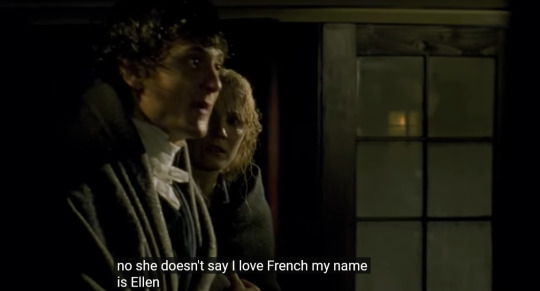


Sadly I didn’t get to watch more than this one scene with YouTube’s crazy auto-generated subtitles before the episodes were taken down but I was cackling for ages after seeing these.
#to be fair bush isn't wrong#there is a fraud going on#and hi there ellen welcome aboard the hotspur#hornblower#hornblower: duty#paul mcgann#david birkin#camilla power#william bush#jerome bonaparte#betsy wetsy bonaparte#i was actually making gifs and trying to work out how jerome's alias was spelt#obviously these were no help whatsoever#crazy youtube subtitles#i am very easily amused i admit it
15 notes
·
View notes
Text
Give me this wonderful amethyst Diadem

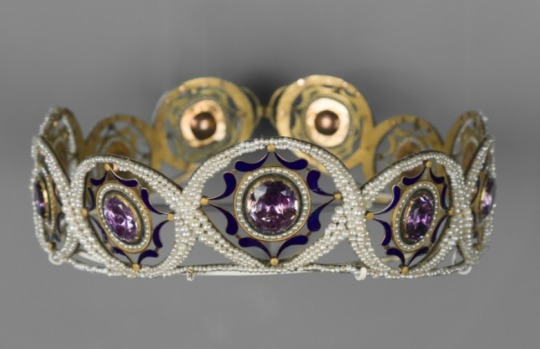
Description
This diadem of amethysts and pearls was given to Elizabeth Patterson Bonaparte (1785-1879) by Prince Jerome Bonaparte (1784-1860) and was part of a large parure with earrings, a bracelet, a pendant and additional amethysts that were set into a bracelets in London. In 1869, Elizabeth recorded, "This Parure sent 1805 by Prince Jerome." Jerome probably sent this to her along with other gifts after he returned to France without her.
circa. 1805
Materials
Amethysts, seed pearls, enamel work, gilded copper alloy
Museum, Maryland Center for History and Culture
#historical fashion#historical jewelry#elizabeth patterson Bonaparte#jerome Bonaparte#Bonaparte#diadem#french empire
10 notes
·
View notes
Text
Jerome Bonaparte’s ‘most respectable susceptibilities’ (or not)
Female playwrights often struggled to find the support needed to produce their works. Savari’s fifteen-year effort to stage her most important play, Divorce impérial (1890), illustrates the type of challenges faced by Belle Époque playwrights. A historical drama about the divorce of Napoléon and Josephine, the Divorce impérial was mired in controversy from its beginnings. Initially, Savari’s efforts to stage her play appeared promising. A rumour circulated that it would be performed at l’Eden by the actors of the Comédie Française. The plan failed however when the director of the Comédie, Jules Claretie, refused to allow his actors to perform. In what would become a familiar act of retaliation, Savari published a letter in the press inviting Claretie to explain himself before all of the ‘Paris lettré’: ‘You must have reasons, you, a Potentate of the Republic of Letters,’ wrote Savari, ‘to block the attempts of a debutante who is simply looking to earn her living and that of her children.’[22]
In addition to the challenges in promoting their work, women artists also had to contend with ridicule and predatory behaviours. In the wake of the Claretie controversy, Jérôme Bonaparte, the nephew of Napoléon, wrote a letter that created a stir in the French and international press. Bonaparte accused Savari’s play of offending ‘the most respectable susceptibilities.’ Savari immediately defended herself, citing her conscientious study of Napoleon’s character.[23] Bonaparte’s letter, it turned out, was a hoax, probably intended to ridicule Savari’s abilities as a playwright and to discredit a work that specifically addressed the condition of women in marriage.[24] Savari’s woes as a dramatist were far from over. In 1885, she accused Emile Bergerat, playwright and former journalist colleague at the Gil Blas of having plagiarized the title Divorce impérial. A couple of years later, still intent on producing the play, she was duped by a fraudulent impresario.[25] Ever tenacious, Savari conducted numerous readings of the play throughout this period, in Dieppe, the Hague, Rouen, as well as at London’s Mansion House, the official residence of the Lord Mayor of London.[26] The play was finally performed to positive reviews in 1904, shortly before being approved by the Chambre sur la censure dramatique. [27]
Danielle C. Dubois, ‘Pauline Savari’s practical feminism in the Belle Époque: unionization, cooperatives and insurance for working mothers (1887–1907)’
2 notes
·
View notes
Text
Apparently it wasn’t just Napoleon and Alexander who got along well during their meetings but also their younger brothers, King Jerome and Grand Duke Constantine! While the two Emperors do all the ceremonial stuff and chat amiably together, their brothers go to parties with Murat, get drunk with the french actresses and pull pranks on local nobles. Amazing.


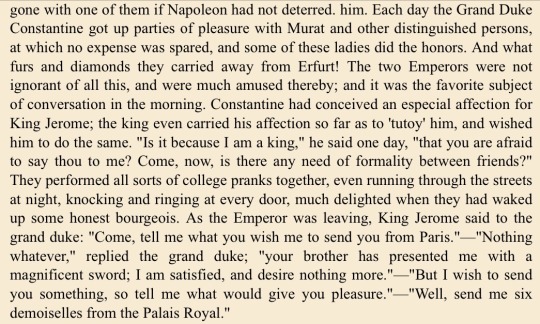
#excerpt from louis constant memoirs#i hope native english speakers understand the ‘tutoy’ thing#napoleon bonaparte#king jerome bonaparte#drand duke constantine pavlovich#tsar alexander i#alexander i of russia#congress of erfurt#napoleonic wars
140 notes
·
View notes
Text
Sounds fake but true, but it just feels unreal to remember that a Bonaparte founded the organization that would become the FBI in the US...

#(it was Jerome's grandson btw)#not art#nothing of significance ofc 😅#scribblings#historical trivia#american history#sort of#les bonapartes americains#(lmao)#charles joseph bonaparte
4 notes
·
View notes
Text
Letter from Napoleon to his brother, Jérôme. A really interesting letter as I think it clearly displays his unique idealism:
My concern is for the well-being of your people [Westphalians], not only as it affects your standing and my own, but also because of the impact it has on the whole condition of Europe. Do not listen to anyone who says that your subjects, being so long accustomed to servitude, will fail to feel gratitude for the freedoms you bring to them. The common people of Westphalia are more enlightened than such individuals would have you believe, and your rule will never have a secure basis without the people’s complete trust and affection. What the people of Germany impatiently desire is that men without nobility but of genuine ability will have an equal claim upon your favor and advancement, and that every trace of serfdom and feudal privilege... be completely done away with. Let the blessings of the Code Napoleon, open procedures and use of juries be the centerpiece of your administration... I want all your peoples to enjoy liberty, equality, and prosperity alike and to such a degree as no German people has yet known.... Everywhere in Europe—in Germany, France, Italy, Spain—people are longing for equality and liberal government... So govern according to your new constitution. Even if reason and the enlightened ideas of our age did not suffice to justify this call, it still would be a smart policy for anyone in your position—for you will find that the genuine support of the people is a source of strength to you that none of the absolutist monarchs neighboring you will ever have.
Source: Napoleon to Jérôme, November 15, 1807, in Napoleon, Correspondance générale, ed. Thierry Lentz (Paris: Fayard, 2004), VII: 1321.
English translation: Alexander Mikaberidze, The Napoleonic Wars: A Global History
#Napoleon’s correspondence#Napoleon#napoleon bonaparte#The Napoleonic Wars: A Global History#napoleonic era#napoleonic#first french empire#Jerome#jerome bonaparte#Jérôme Bonaparte#Napoleon’s brothers#Napoleon’s reforms#napoleonic reforms#reforms#Westphalia#Germany#1807#1800s#Thierry Lentz#french empire#19th century#letter#letters
23 notes
·
View notes
Text

Society ladies on Park Avenue selling tickets to a fair at Luna Park, Coney Island, May 16, 1922. Mrs. Jerome Napoleon Bonaparte (?!) is selling tickets at a kiosk.
Photo: Bettmann Archives/Getty Images/Fine Art America
#vintage New York#1920s#high society#fair#Park Ave.#May 16#16 May#1920s fashion#benefits#charity fair
310 notes
·
View notes
Text
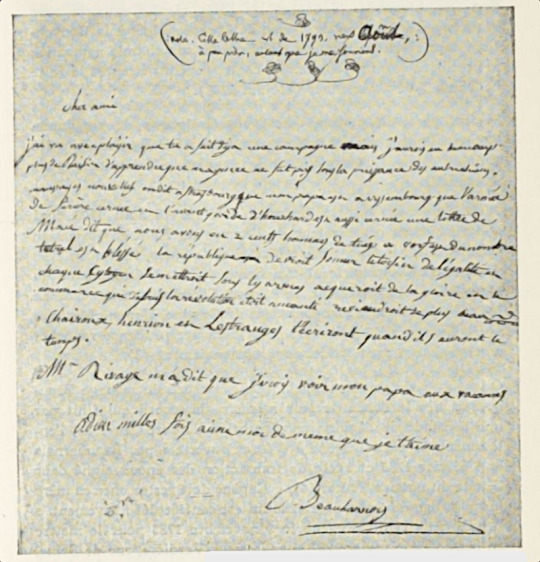
(Sorry to bother folks with yet another non-art post about non-popular guys but I was so excited to find this I just have to tell somebody!)
The "Revue du Rhin" from September 1937 published a letter from Eugène de Beauharnais and another from Jérôme Bonaparte to Eugène. And the letter scribbled written by Eugène is the earliest I've come across so far - his dad is still alive at that point and still at the head of the army (while he has already failed to defend Mainz).
The letter is directed at one Louis Apffel, an obviously somewhat older friend, as he seems to be already with the army. It's undated, but the recipient has noted on top that he believes to have received it in August 1793, which would fit the events mentioned in the letter. The translation, including random capitalization and lack of punctuation, reads:
-
Dear Friend,
I saw with pleasure that you have already made a campaign but I would have had much more Pleasure to learn that Mayence was not under the power of the Austrians, bad news one says in Strasbourg that my papa is in Wissembourg that the army of Ferrière is surrounded and the vanguard of Houchard is also surrounded a letter of Macé says that we had 2 hundred men killed in Vorth is of the number tetrel is wounded, the republic should sound the tocsin of legality and each citizen would put himself under arms would acquire glory and the trade which since the revolution was destroyed would come back more beautiful - Chairoux, henrion and Lestranges will write to you when they have time.
Monsieur Rivage told me that I would be going to see my papa during the holidays.
Adieu a thousand times, love me as much as
I love you
Beauharnais
-
Eugène at this point is 11 years old, and as the article states, him talking about events in the war in such detail and especially him considering the effects on trade are somewhat strange for a boy his age. What Eugène obviously does not suspect yet is the consequences the loss of Mayence would have for his father, who would soon leave the army and try to make himself forgotten, before being arrested and, not quite a year after Eugène wrote this letter, executed.
The article continues to describe Alexandre de Beauharnais' military record in not exactly flattering terms 😋 and to identify the generals, classmates and teachers Eugène mentions.
The second letter is one of recommendation, written four years later, in 1797, by Jérôme, most likely for the same Louis Apffel who had come to visit his former classmate in his college of Saint-Germain (probably in order to get in contact with Eugène's new stepfather), only to learn that Eugène three months earlier had left for Italy as general Bonaparte's aide-de-camp. Apparently he was going to follow him there and wanted to make sure he would be allowed to approach the general's family.
And if you thought Eugène's handwriting was bad, here's Jérôme:
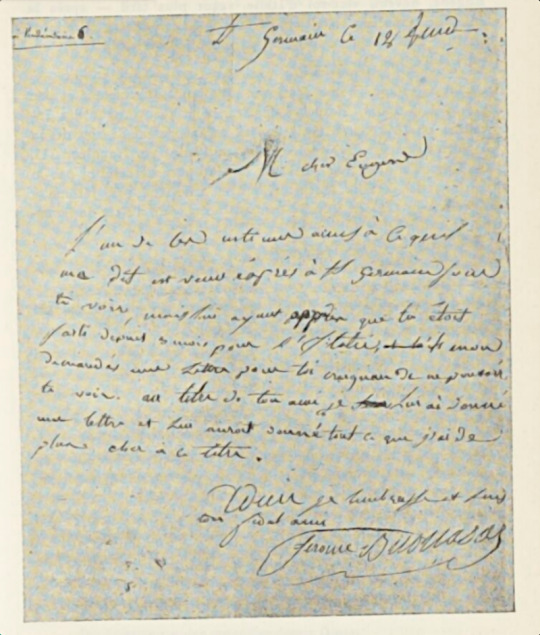
Translation:
My dear Eugène
One of your close friends, as he tells me, came expressly to St. Germain to see you, but on learning that you had left 3 months ago for Italy, they asked me for a letter for you, fearing that they would not be able to see you. In the name of your friend I gave him a letter and would have given him everything I hold dearest in this capacity.
Farewell, I embrace you and I am your faithful friend.
Jérôme Buonaparte
-
I like how Jérôme is obviously not stupid (your friend "as he tells me" - who however doesn't know your whereabouts). And as he speaks of several people who wanted to get in touch with Eugène, now that Eugène was the stepson of the most famous army general, I wonder if this may have been the whole family of Louis Apffel, trying to take advantage of the fact their son had once been in school with Eugène.
15 notes
·
View notes
Text

• Diadem.
Date: ca. 1805
Medium: Amethysts and pearls
▪︎This diadem was given to Elizabeth Patterson Bonaparte (1785-1879) by Jerome Bonaparte (1784-1860). It was part of a larger set containing earrings, a bracelet, a pendant and additional amethysts that were set into a bracelets in London. In 1869, Elizabeth records, "This Parure sent 1805 by Prince Jerome." Jerome probably sent this to her along with other gifts after he returned to France without her.
#fashion history#history of fashion#fashion#19th century fashion#19th century#early 19th century#antique jewelry#antique#diadem#amethyst#pearls#bonaparte#ca. 1805
634 notes
·
View notes
Note
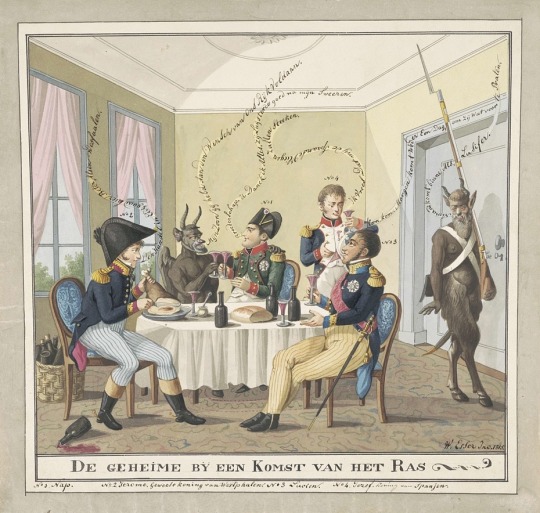
Napoleon having a nice meal with his brothers Jerome, Joseph, Lucien and Satan. It’s too bad Louis couldn’t make it!
Rating: Cute!
It’s great that you got a Satan to be a companion for your Napoleon. If British zoologists are to be believed, and I guess we have to believe them since we are typing in English, than Napoleon’s greatest and most enthusiastic allies are usually Satans!
If anything, maybe you should…you know, take those other Bonaparte siblings to a shelter. Napoleons can be simultaneously overindulgent to their family and throw them crowns that they don’t know how to play with, and also overly bossy - it’s a lose/lose.
23 notes
·
View notes